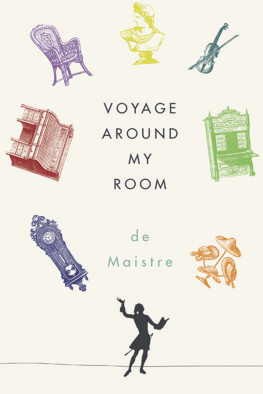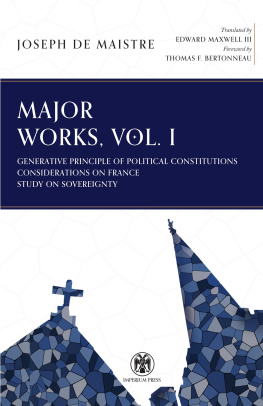Count Xavier de Maistre has come down to us as one of those men whose presence serves to console us for a great many disappointments in literature and gently reconciles us with human nature.... One derives both pleasure and benefit from more than a few of his nave and subtle judgments.
INTRODUCTION
Invitation to the Voyages of Xavier de Maistre
A
In 1790, Count Xavier de Maistre, a twenty-seven-year-old Savoyard officer stationed in Turin, fought a duel with a Piedmontese officer and was put under house arrest for forty-two days, an interval during which he wrote a text to beguile the languors of his solitudehaving hitherto shown no trace of a literary vocationand in 1794 he left the manuscript of Voyage autour de ma chambre in Lausanne with his older brother Joseph, who published it there the following year without the authors knowledge. Two centuries later we are astonished by the many anomalies which these circumstances present to current notions of authorship, of intellectuality, and of what we might call the military necessity. Our amazement at the oddities of the young counts career will be enhanced by our discovery that he was an early enthusiast of the brothers Montgolfier, that he flew in a hot-air balloon at the age of twenty-one, and that he described the ascent in a Letter Containing an Account of the Aerostatic Experiment of Chambry (1784).
B
In 1798 Count Xavier, delighted by his unsuspected status as a littrateur, began writing a sequel, Expdition nocturne autour de ma chambre, which his brother advised against publishingaccording to the Spanish proverb, Part II is always badand which remained in manuscript until 1825, four years after Josephs death, when the (inaccurately titled) Oeuvres compltes de Xavier de Maistre appeared in Paris with considerable success. Subsequently these brief texts have been accorded a certain classical, or academic, success; they are rcits, a genre which has long been appreciated in France (from Constant to Camus, with brilliant illustrations by Gide and Blanchot) and exemplified as well in Russia (Notes from Underground, for example), in Italy, and of course in England, where the personal essay invariably threatens to spill over into this protean form. A rcit is a sort of dramatic monologue in prose concerned with the problematics of narrative, questioning the nature of such pronouns as I, he, and you, and given, as Northrop Frye has determined, to notions of literature as process rather than as product. De Maistres versions are among the liveliest and the most lenient in the repertoire.
C
In 1810 Count Xavierwhose brother, now plenipotentiary envoy of the Kingdom of Sardinia to St. Petersburg, has arranged for him to be appointed director of the Admiralty Museum while serving as a colonel in the tsars armyattends a gathering where, during a discussion of leprosy in Scripture, someone asserts that the disease no longer exists; Xavier excitedly describes a leper he had known in Aosta. Joseph encourages him to write the account, which is published the following year as Le Lpreux de la Cit dAoste, along with the Voyage autor de ma chambre, in St. Petersburg.
D
It is necessary to recall the qualities of this overwhelming older brother, whose genius for provocation was matched only by the eloquence of his umbrage and the dogmatic vehemence of his contempt. Embodying Catholic reaction against the doctrines of the philosophes, Joseph de Maistre, in a series of scathing works beginning with Considrations sur la France (1796) and culminating in Du Pape (1819) and Les Soires de Saint-Ptersbourg (1820), brandished anathemas with enthusiastic cruelty, and raised his repudiations of science, of progress, of democracy, and of tolerance to the dignity of scandal. It is to him that the roots of French fascism descend, and it is no surprise to find this apologist for capital punishment praised by Baudelaire, who once said that De Maistre and Edgar Poe taught me to reason. Nothing of his aggressive, indeed his insolent lucidity is shared by the younger brother, but the charm and amenity of Xaviers texts provide a kind of responsive alternative to the arrogance of Josephs prejudices.
E
In 1838 Count Xavierhaving served with distinction in the Russian armies against Napoleon (the man from Hell), whose retreat in 1812 his letters eloquently describe; having married a Russian woman in 1813 and had a son in 1817; having given up his military career in 1816 and having lived a tranquil family life in St. Petersburg for ten years; having returned to Italy in 1826, after his brothers death in 1821, leading in his beloved Turin the life of an important man of the worldvisits Paris for the first time (and meets Sainte-Beuve, who consecrates his literary success by an essay in 1839).
Savoy, Sardinia, Switzerland, Italy, Russia: in pre-Bonaparte Europe it is possible to express (and to feel) allegiances to all these protonational entities and still be (or become) a French writer, readily acknowledged, even proclaimed, as Xavier de Maistre has been, a characteristic practitioner of a certain engaging resonance, informal and even capricious, yet immitigably a part of the realm of polite letters.
F
Virtually unknown to English-speaking readers today (though there have been earlier translations), Le Voyage autour de ma chambre flaunts its filiations (as in Chapter XIX, Chapter XXVIII) with the powerful model of deviation and even of subversion established by Sterne, a resonance that would be echoed throughout Europe and even in Latin America (from Goncharov to Machado de Assis); Sainte-Beuve detected even more of the grace souriante et sensible of Charles Lamb in these whimsical chapters, and managed, as well, to find in De Maistres incidental verses something of the lucky innocence of La Fontaine, as in these first lines of his pitaphe;
Under this gray stone, Xavier lies
To whom everything was a surprise:
Where did the wind come from, he wondered,
And why was it that Jupiter thundered?
How flabbergasting it is that the young count should also have been a passionate admirer of Ossian!
Certainly the point of Xaviers voyages is not to keep us wondering what will happen next, but what the author will think of next: this is a literature of the irregular and unpredictable, tending to brief or even fragmentary utterance. The qualities of consciousness are recessive, and operate in flashes, in explosions of insight which are not likely to sustain any sort of continuous development.
But such explosions are often of an astonishing brilliance in themselves, unlikely to quit the memory, and they foreshadow, so to speak, much that has been more laboriously and systematically discovered by our ulterior science, our psychology of the unconscious. I refer, for example, to what in Chapter VI De Maistre calls his system of the soul and the beast. Here he accounts, in the blithest fashion, for that entire Faustian division of the self which was to become one of the great tragic themes in Western culture:
I have conducted I know not how many experiments on the union of these two heterogeneous creatures. For example, I have clearly determined that the soul can command obedience from the beast, and that, by an unfortunate reciprocity, the latter can very often compel the soul to act against her will.... When you are reading a book, Monsieur, and a thought more agreeable than the rest suddenly enters your mind, your soul clings to it at once and forgets the book. As your eyes mechanically follow the words and lines, you reach the end of the page without understanding or remembering what you have just read; and this is because your soul, having ordered her companion to do the reading in her place, did not inform him that she was about to absent herself briefly, and thus the












